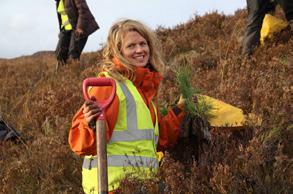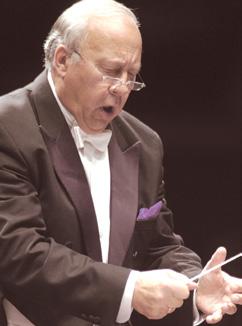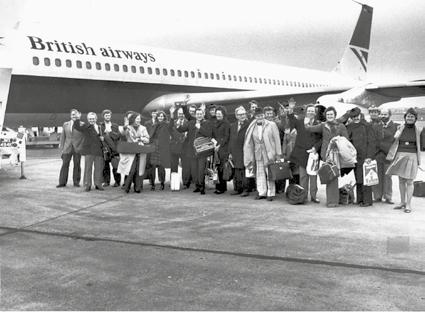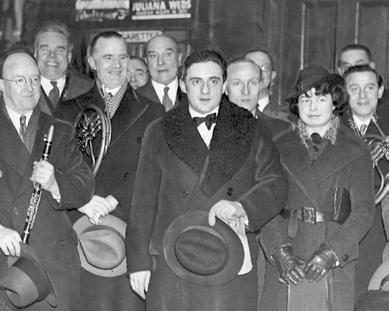










































































































































































































































































































































































































































































































































































































































































































The rhythm, the joy, the sheer headlong energy: there’s a reason why many musiclovers list the Seventh as their favourite Beethoven symphony. It’s one of those pieces that makes you feel glad to be alive. The same goes for Grieg’s much-loved, deeply romantic Piano Concerto; the brilliant Denis Kozhukhin will make it sparkle like it’s new. Conductor Jonathon Heyward opens the concert with Sir James MacMillan’s haunting, impassioned Larghetto for Orchestra
SIR JAMES MACMILLAN
Larghetto for Orchestra [15’]
SCOTCH SNAPS SCOTCH SNAPS SCOTCH SNAPS
GRIEG Piano Concerto in A minor Op16 [30’]
SCOTCH SNAPS SCOTCH SNAPS SCOTCH SNAPS
BEETHOVEN Symphony No7 in A major Op92 [35’]
Jonathon Heyward Conductor
Denis Kozhukhin Piano
Royal Scottish National Orchestra

USHER HALL, EDINBURGH
Fri 18 Nov 2022 7.30pm
GLASGOW ROYAL CONCERT HALL
Sat 19 Nov 7.30pm
The Glasgow performance will be recorded for the RSNO Archive. Supported by the Iain and Pamela Sinclair Legacy.
If viewing these notes at the concert, please do so considerately and not during performances. Please silence all mobile telephones and alerts, and refrain from taking photographs, without flash, until the end of each piece.

Welcome to this evening’s concert. This weekend we have two changes to our advertised programme: Denis Kozhukhin replaces Joyce Yang and conductor Jonathon Heyward joins us in place of Edo de Waart.
Last Season I spoke of how flexible and reactive the classical music industry has become in recent times, and that along with the disappointment of a cancellation comes a great sense of anticipation. Behind the scenes, administrators, agents and managers work rapidly to ensure we still deliver a fantastic Season concert. You never know when you are at the beginning of something special, and I’m reminded this week that our Music Director Thomas Søndergård first appeared with the Orchestra as a last-minute stand-in.
This weekend’s performances will be the first time Jonathon has performed live with the RSNO. However, we were lucky to work with him almost a year ago on Rachel Barton Pine’s recording of Florence Price’s Second Violin Concerto. The recording was released on the Cedille label in September and has reached No5 on the US Billboard Classical Album Chart.
Jonathon was a fantastic presence at Scotland’s Studio within the RSNO Centre, and I know that our musicians have been looking forward to working with him again. You can find a behind-the-scenes video which Rachel and Jonathon made during the recording session on Rachel’s official Facebook page.
Last week at Britten’s War Requiem you may have noticed an extra guest on stage. Acclaimed Scottish painter Gerard Burns joined the musicians to watch them perform before he starts work on a new piece celebrating the Orchestra. It is a joy to watch artists of different disciplines support and sustain each other, and I can’t wait to share updates from Gerard on this exciting new work.
As we see cultural bodies face funding cuts and closures, it is vitally important that we maintain a vibrant community of artists and supporters, and continue to share our rich cultural offerings with the wider world.
Alistair Mackie CHIEF EXECUTIVE









































































Thomas Søndergård 1
MUSIC DIRECTOR Elim Chan 2
PRINCIPAL GUEST CONDUCTOR Neeme Järvi 3
CONDUCTOR LAUREATE Alexander Lazarev 4 CONDUCTOR EMERITUS Kellen Gray 5
ASSISTANT CONDUCTOR Stephen Doughty 6
CHORUS DIRECTOR, RSNO CHORUS Patrick Barrett 7
CHORUS DIRECTOR, RSNO JUNIOR CHORUS
FIRST VIOLIN
Maya Iwabuchi LEADER 8 Sharon Roffman LEADER 9 Lena Zeliszewska 10
ASSOCIATE LEADER
Tamás Fejes ASSISTANT LEADER 11 Patrick Curlett ASSISTANT PRINCIPAL 12
Caroline Parry 13 Ursula Heidecker Allen 14 Lorna Rough 15 Susannah Lowdon 16 Alan Manson 17 Elizabeth Bamping 18
SECOND VIOLIN
Jacqueline Speirs 19 ASSOCIATE PRINCIPAL Marion Wilson ASSOCIATE PRINCIPAL 20 Harriet Hunter SUB PRINCIPAL 21
Nigel Mason 22 Wanda Wojtasinska 23 Paul Medd 24 Anne Bünemann 25 Sophie Lang 26 Robin Wilson 27 Emily Nenniger 28
Tom Dunn PRINCIPAL 29 Felix Tanner
ASSOCIATE PRINCIPAL VIOLA 30 Asher Zaccardelli ASSISTANT PRINCIPAL 31 Susan Buchan SUB PRINCIPAL 32 Lisa Rourke SUB PRINCIPAL 33
Nicola McWhirter 34 Claire Dunn 35 Katherine Wren 36 Maria Trittinger 37 Francesca Hunt 38
Betsy Taylor ASSOCIATE PRINCIPAL 39 Kennedy Leitch ASSISTANT PRINCIPAL 40 Rachael Lee 41 Sarah Digger 42 Robert Anderson 43
Margarida Castro 44 ASSOCIATE PRINCIPAL Michael Rae ASSISTANT PRINCIPAL 45 Sally Davis 46 Aaron Berrera Reyes 47
Katherine Bryan PRINCIPAL 48 Helen Brew ASSOCIATE PRINCIPAL 49 Janet Richardson 50 PRINCIPAL PICCOLO
Adrian Wilson PRINCIPAL 51 Peter Dykes ASSOCIATE PRINCIPAL 52 Henry Clay PRINCIPAL COR ANGLAIS 53
Timothy Orpen 54 PRINCIPAL CLARINET Duncan Swindells 55 PRINCIPAL BASS CLARINET
David Hubbard PRINCIPAL 56 Luis Eisen ASSOCIATE PRINCIPAL 57 Paolo Dutto 58 PRINCIPAL CONTRABASSOON
Christopher Gough PRINCIPAL 59 Alison Murray ASSISTANT PRINCIPAL 60 Andrew McLean 61 ASSOCIATE PRINCIPAL David McClenaghan 62 Martin Murphy ASSISTANT PRINCIPAL 63
Christopher Hart PRINCIPAL 64 Marcus Pope SUB PRINCIPAL 65 Jason Lewis ASSOCIATE PRINCIPAL 66
Dávur Juul Magnussen PRINCIPAL 67 Lance Green ASSOCIATE PRINCIPAL 68 Alastair Sinclair 69 PRINCIPAL BASS TROMBONE
John Whitener PRINCIPAL 70
TIMPANI Paul Philbert PRINCIPAL 71
Simon Lowdon PRINCIPAL 72 John Poulter ASSOCIATE PRINCIPAL 73

In 2017 I decided to arrange an earlier choral piece of mine for orchestra. I had set the Miserere in 2009, but felt that the music could also have an instrumental existence too. The resulting Larghetto for orchestra is imbued with the singing quality of the original piece, but is also shaped by its sad and lamenting character. The work opens with a ‘chorale’ on a choir of cellos and is soon answered by mourning phrases in the violins, which are punctuated by solemn brass chords.
Orchestral version: Pittsburgh, 27 October 2017
DURATION 15 minutes
The middle section presents brass soloists playing monotone-based phrases like plainchant before the cellos return ‘in choir’ with the opening theme. The chanting eventually returns over a slowly building static chord, which gives the ‘liturgical’ character of the music a strange and ethereal turn of direction. In the final section the main theme, which so far has appeared in the minor, recapitulates in the major, giving the closing moments of the Larghetto a hymn-like sense of devotion within a Celtic modality.
© Sir James MacMillanSir James MacMillan is one of today’s most successful composers. He performs internationally as a conductor. His musical language is flooded with influences from his Scottish heritage, Catholic faith, social conscience and close connection with Celtic folk music, blended with influences from Far Eastern, Scandinavian and Eastern European music.
MacMillan first became internationally recognised after the extraordinary success of The Confession of Isobel Gowdie at the BBC Proms in 1990. His prolific output has since been performed and broadcast around the world. His major works include percussion concerto Veni, Veni, Emmanuel, which has received close to 500 performances, a cello concerto for Mstislav Rostropovich and five symphonies. Recent major works include his Percussion Concerto No2 for Colin Currie, and his Symphony No5 Le grand inconnu, written for The Sixteen, which premiered at the 2019 Edinburgh International Festival.
MacMillan enjoys a flourishing career as conductor of his own music alongside a range of contemporary and standard repertoire, praised for the composer’s insight he brings to each score. He was Principal Guest Conductor of the Netherlands Radio Chamber Philharmonic until 2013 and Composer/ Conductor of the BBC Philharmonic until 2009. In January 2021 he conducted the Netherlands Radio Philharmonic Orchestra in the world premiere of his Christmas Oratorio; later that year the work received its UK premiere with the London Philharmonic Orchestra. Other recent highlights include a major feature at the 2019 EIF as part of his 60th birthday year
Highlights of the 2022/23 season include conducting engagements with the St Louis Symphony Orchestra, Netherlands Radio Philharmonic, Lahti Symphony Orchestra and Swedish Chamber Orchestra, and a performance of Handel’s Messiah with Edinburgh Royal Choral Union. A number of new works receive world premieres, including his Violin Concerto No2 with Nicola Benedetti, a Piano Quintet, Ye Sacred Muses for The King’s Singers, Her tears fell with the dews at even with the Pittsburgh Symphony Orchestra, a choral work for the Cincinnati Symphony Orchestra and Fiat Lux with the Pacific Symphony.
MacMillan has directed many of his own works on disc for Chandos, BIS and BMG, most recently a series on Challenge Records including his violin concerto A Deep but Dazzling Darkness and percussion concerto Veni, Veni, Emmanuel with the Netherlands Radio Chamber Philharmonic. His release on Harmonia Mundi conducting Britten Sinfonia included his Oboe Concerto and won the 2016 BBC Music Magazine Award. In 2017 The Sixteen’s recording of his Stabat Mater was nominated for a Gramophone Award and won the Diapason d’Or Choral Award.
MacMillan founded the annual music festival The Cumnock Tryst, which takes place in his native Ayrshire, in October 2014. He was awarded a CBE in 2004 and a Knighthood in 2015.
PERFORMANCE Copenhagen, 3 April 1869 DURATION 30 minutes
Edvard Grieg’s Piano Concerto in A minor is one of the best known and loved of all piano concertos, and has been since the young composer’s only large-scale work was premiered to instant success in 1869 in Copenhagen, with the pianist Edmund Neupert. ‘It is not surprising that everyone should delight in Grieg,’ said Tchaikovsky of the composer’s work. ‘There prevails a fascinating melancholy which seems to reflect in itself all the beauty of Norwegian scenery, now grandiose and sublime in its vast expanse, now grey and dull, but always full of charm … that rarest of qualities, a perfect simplicity, far removed from affectation and pretence …’ Other composers too were enthusiastic, although Debussy was later a notable exception.

Franz Liszt was so taken with Grieg’s music that he invited him to his house in Weimar, with typical Lisztian enthusiasm. Grieg brought the piano concerto on his second visit, but when he refused to play, Liszt sat down and played it through, orchestra part included –with great panache, according to Grieg. The young composer, not long out of the Leipzig Conservatory, described the experience in a letter home. ‘Keep on, I tell you,’ he recalled Liszt telling him, on his second play-through of a work that Grieg was to revise some seven times over his lifetime. ‘You have what is needed, and don’t let them frighten you.’
The solo part, and its interplay with the orchestra, contained a brilliance that spoke to Liszt, yet Grieg had found the inspiration for his piano concerto partly in Schumann’s equally famous piano concerto, also in A minor. Ever taken with Schumann’s concerto, which he had heard in what he described as a revelatory performance by Clara Schumann in Leipzig in 1858, Grieg loosely modelled his work on the
earlier composer’s. And yet the concerto work was distinctively Grieg, his unique musical language marking an important point in the Norwegian drive towards a ‘national’ music.
Tchaikovsky had been right to spot this sense of Norwegian-ness, for Grieg had become fascinated with Norwegian folk song. Intrigued by their measure and by the notion of a true Norwegian national music in a country which had been so closely a part of both Denmark and Sweden over the preceding centuries, Grieg mined the structures and tonalities of Norway’s folk music to inspire his own original interpretation, marked with his own harmonic ideas. The notion of Norwegian independence had held sway over much of the 19th century, although the country would not achieve that goal until 1905, and Grieg’s music was seen as fuel to the fire in a Europe that was taken by the idea of nationalism, and the expression of national character, in music.
The Norwegian-ness in Grieg’s concerto comes in the falling, distinctive seconds and thirds of the opening bars, the fiddle-like tunes of the Adagio and the ‘halling’ dance of the third. Indeed, while Grieg subsequently started a B minor piano concerto, it was never finished. He instead concentrated on folk-influenced song and small pieces of orchestral and solo music which took the essence of the folk-song canon, but never actually used the melodies themselves. These works proved influential to the next generation of both Scandinavian and European composers.
© Sarah Urwin Jones5 Jan Scotland’s oldest professional football team, Kilmarnock FC, was founded
3 Mar Henry Wood, founder of the Proms, was born
4 Mar UIysses S Grant was sworn in as 18th President of the United States
18 Mar Dmitri Mendeleev presented his periodic table of chemical elements to the Russian Chemical Society
10 May The first transcontinental railroad in North America was completed at Promontory, Utah
22 May The first Sainsbury’s store opened in Drury Lane, London
16 Oct Emily Davies and Barbara Bodichon founded England’s first residential university-level college for women, at Hitchin
17 Nov The Suez Canal, linking the Mediterranean Sea and the Red Sea, was inaugurated
23 Nov The clipper Cutty Sark was launched at Dumbarton
8 Dec The First Vatican Council, at which papal infallibility was defined, opened in Rome
31 Dec French artist Henri Matisse was born
PERFORMANCE Vienna, 8 December 1813 DURATION 35 minutes
For much of his adult life, Beethoven was plagued by ill health: increasing deafness, ringing in the ears (tinnitus), headaches, stomach pains, rheumatic attacks, and on top of it all a tendency to profound depression. But he also had a remarkable ability not just to endure, but to rise above suffering – a quality many listeners can hear in his music. Sometimes it was work that saved him; at others it was the experience of recovery that gave new energy to composition, as was very much the case with the Seventh Symphony. In 1811 Beethoven spent the summer in the Bohemian spa town of Teplitz (now Teplice in the Czech Republic), a place of relative peace and safety in turbulent times (Napoleon’s warmongering was still causing huge suffering in Europe). Beethoven returned home to Vienna with plans for two symphonies. He began writing the first of these, his Seventh, almost immediately; the second took rather longer, emerging 12 years later as the monumental choral Ninth.
At times the Seventh Symphony seems ready to burst with renewed energy – this is the symphony Wagner famously described as ‘the apotheosis of the dance’. Its sheer dynamism, expressed in bracing muscular rhythms and brilliant orchestration, can in some performances border on the unnerving. Beethoven’s younger compatriot, Carl Maria von Weber, produced some pretty startling music himself, but confronted with the Seventh Symphony’s obsessively repeating crescendos he announced that Beethoven was now ‘ripe for the madhouse’. What sounded like madness to some, especially at first, now sounds to many like a joyous abundance of life. To borrow a line from Beethoven’s contemporary, William Blake, ‘Exuberance is beauty.’

Slow woodwind phrases open the symphony, brusquely punctuated by full orchestral chords – not much to dance about here, one might think. But then faster string figures galvanise the music into physical action. Eventually this slow introduction settles on a single note, passed between woodwind and strings, which soon develops into a sprightly dotted rhythm, and the Vivace begins. This rhythm –an emphatic long note followed by two short ones (ONE – two-three) – not only dominates this movement but plays a crucial part in the other three. You can also hear it in the main theme of the following Allegretto, after the initial minor key wind chord. This magically atmospheric movement, with its hypnotic, sleepwalking tread again (ONE – two-three), was such a success at its first performance that it had to be repeated. It evidently made a deep impression on another, younger, Viennese composer, Franz Schubert.
Next, the Presto bursts into life. This has all the racing forward momentum of a typical Beethoven Scherzo, twice interrupted by a slower Trio section (led by another version of the ONE – two-three rhythmic pattern). One last fading echo of the slower Trio theme is dismissed by five crisp orchestral chords. After this the finale is a magnificent dance of triumph, pounding out almost to frenzy the symphony’s seminal ONE – two-three. The final build-up results in two huge waves of sound, each culminating in a blazing fff (fortississimo), leading to a stamping gesture like the last flourish of an elemental flamenco.
© Stephen Johnson24 Jan The Philharmonic Society (later gaining royal patronage) was founded in London
28 Jan Jane Austen’s Pride and Prejudice was published – anonymously – in London
4 Mar James Madison was sworn in for a second term as US President
17 Mar In the Napoleonic Wars, Prussia declared war on France
19 Mar Scottish missionary and explorer David Livingstone was born
22 May Richard Wagner, composer of the Ring cycle of operas, was born in Leipzig
6 Jun European settlers Blaxland, Lawson and Wentworth successfully crossed Australia’s Blue Mountains
12 Aug In the Napoleonic Wars, Austria declared war on France
10 Oct Giuseppe Verdi, Italian composer of the operas La traviata and Aida, was born
25 Dec William Debenham and Thomas Clark formed a partnership to run a draper’s store at 44 Wigmore Street, London
He also appears at the Tsinandali Festival in Georgia, Schloss-Elmau in Germany, and in recital at Carnegie Hall, Cadogan Hall, deSingel Antwerp, Megaron Athens, and at the Lille Piano Festival.
His most recent recording, of César Franck’s Symphonic Variations with the Luxembourg Philharmonic Orchestra under Gustavo Gimeno, was released in 2020, joining earlier albums of Mendelssohn’s Songs Without Words with Grieg’s Lyric Pieces, and discs of Haydn, Brahms and Prokofiev, as well as concertos by Tchaikovsky, Grieg, Ravel and Gershwin.
Winner of the First Prize in the 2010 Queen Elisabeth Competition in Brussels, Denis Kozhukhin has established himself as one of the greatest pianists of his generation. He frequently appears with many of the leading international orchestras, such as the Royal Concertgebouw Amsterdam, London Symphony, Staatskapelle Berlin, Israel Philharmonic, Chicago Symphony, Philadelphia Orchestra, San Francisco Symphony, Rotterdam Philharmonic, London Philharmonic and Philharmonia Orchestra, among many others. He is also regularly invited to such festivals as Verbier, Gstaad, Grafenegg and Dresden, the Jerusalem Chamber Music Festival and the BBC Proms.

Highlights of his 2022/23 season include collaborations with the Danish National Orchestra, NDR Radiophilharmonie Hanover, HR-Sinfonieorchester Frankfurt, Vienna Radio Symphony, BBC Scottish Symphony Orchestra, Gulbenkian Orchestra Lisbon, Belgian National Orchestra, Indianapolis Symphony Orchestra and Borusan Istanbul Philharmonic Orchestra.
Kozhukhin studied at the Reina Sofía School of Music in Madrid with Dmitri Bashkirov and Claudio Martínez Mehner, and later completed his studies at the Piano Academy at Lake Como, where he received advice from Fou Ts’ong, Stanislav Ioudenitch, Peter Frankl, Boris Berman, Charles Rosen and Andreas Staier, and with Kirill Gerstein in Stuttgart.
In recent years he has been mentored by Daniel Barenboim.
The RSNO is indebted to Denis Kozhukhin for stepping in to replace Joyce Yang at very short notice.
In his native United States, Jonathon made his Wolf Trap debut conducting the National Symphony Orchestra in Washington, DC, followed by hugely successful debuts with the Atlanta, Detroit and San Diego Symphony orchestras. This year he debuts with the Houston and St Louis Symphony orchestras and at the Grant Park and Mostly Mozart festivals, and returns to the Seattle Symphony.
Jonathon made his Royal Opera House debut with Hannah Kendall’s The Knife of Dawn, and has conducted Weill’s Lost in the Stars with the Los Angeles Chamber Orchestra and the world premiere of Giorgio Battistelli’s Wake for the Birmingham Opera Company.
Jonathon Heyward is Music Director Designate of the Baltimore Symphony Orchestra and begins his five-year contract in 2023. He is currently in his second year as Chief Conductor of the Nordwestdeutsche Philharmonie. In summer 2021 he worked with the National Youth Orchestra of Great Britain, leading to a highly acclaimed BBC Proms debut.

Jonathon’s recent guest conducting highlights in the UK include the London Symphony Orchestra, BBC National Orchestra of Wales, BBC Symphony Orchestra and Scottish Chamber Orchestra. In continental Europe, among Jonathon’s recent debuts are collaborations with the Orquesta Sinfónica de Castilla y León, Sinfonieorchester Basel, Orchestre de Chambre de Lausanne, Brussels Philharmonic, Symfonieorkest Vlaanderen, Antwerp Symphony, Philharmonie Zuidnederland and Kristiansand Symphony Orchestra. In 2022/23 he looks forward to his debuts with the Musikkollegium Winterthur, Orchestre National Bordeaux Aquitaine, Lahti Symphony Orchestra, MDR-Sinfonieorchester and RTÉ National Symphony Orchestra.
Born in Charleston, South Carolina, Jonathon Heyward began his musical training as a cellist at the age of ten and started conducting while still at school. He studied conducting at the Boston Conservatory of Music, where he became assistant conductor of the institution’s opera department and of the Boston Opera Collaborative, and received postgraduate lessons from Sian Edwards at London’s Royal Academy of Music. Before leaving the Academy, he was appointed Assistant Conductor of the Hallé Orchestra, where he was mentored by Sir Mark Elder, and became Music Director of the Hallé Youth Orchestra.
Jonathon’s commitment to education and community outreach work deepened during his three years with the Hallé and has flourished since he arrived as Chief Conductor of the Nordwestdeutsche Philharmonie.
Due to unforeseen circumstances, Edo de Waart is unable to appear with us this evening. The RSNO is extremely grateful to Jonathon Heyward for stepping in at short notice.
Formed in 1891 as the Scottish Orchestra, the company became the Scottish National Orchestra in 1950, and was awarded Royal Patronage in 1977. The Orchestra’s artistic team is led by Danish conductor Thomas Søndergård, who was appointed RSNO Music Director in October 2018, having previously held the position of Principal Guest Conductor. Hong Kong-born conductor Elim Chan succeeds Søndergård as Principal Guest Conductor.

The RSNO performs across Scotland, including concerts in Glasgow, Edinburgh, Dundee, Aberdeen, Perth and Inverness. The Orchestra appears regularly at the Edinburgh International Festival and the BBC Proms, and has made recent tours to the USA, China and Europe.
The Orchestra is joined for choral performances by the RSNO Chorus, directed by Stephen Doughty. The RSNO Chorus evolved from a choir formed in 1843 to sing the first full performance of Handel’s Messiah in Scotland. Today, the RSNO Chorus is one of the most distinguished large symphonic choruses in Britain. The Chorus has performed nearly every work in the standard choral repertoire, along with contemporary works by composers including John Adams, Howard Shore and Sir James MacMillan.
The RSNO has a worldwide reputation for the quality of its recordings, receiving a 2020 Gramophone Classical Music Award for Chopin’s Piano Concertos (soloist: Benjamin Grosvenor), conducted by Elim Chan; two Diapason d’Or awards for Symphonic Music (Denève/Roussel 2007; Denève/Debussy 2012) and eight GRAMMY Awards nominations. Over 200 releases are available, including Thomas Søndergård conducting Strauss (Ein Heldenleben, Der Rosenkavalier Suite) and Prokofiev (Symphonies Nos1 and 5), the complete symphonies of Sibelius (Gibson), Prokofiev (Järvi), Bruckner (Tintner) and Roussel (Denève), as well as further discs championing the music of William Grant Still (Eisenberg), Xiaogang Ye (Serebrier) and Thomas Wilson (Macdonald).
The RSNO’s pioneering learning and engagement programme, Music for Life, aims to engage the people of Scotland with music across key stages of life: Early Years, Nurseries and Schools, Teenagers and Students, Families, Accessing Lives, Working Lives and Retired and Later Life. The team is committed to placing the Orchestra at the centre of Scottish communities via workshops and annual residencies.
FIRST VIOLIN
Maya Iwabuchi
LEADER
Lena Zeliszewska ASSOCIATE LEADER
Tamás Fejes ASSISTANT LEADER
Patrick Curlett
Lorna Rough Laura Embrey
Elizabeth Bamping
Susannah Lowdon Caroline Parry Alan Manson
Ursula Heidecker Allen Alison McIntyre Helena Rose Nia Bevan
SECOND VIOLIN
Jacqueline Speirs
ASSOCIATE PRINCIPAL Marion Wilson
Emily Nenniger
Harriet Hunter
Paul Medd Sophie Lang
Anne Bünemann Robin Wilson
Tom Greed Henry Salmon
Eddy Betancourt Wen Wang VIOLA
Tom Dunn
PRINCIPAL
Asher Zaccardelli
Susan Buchan
Lisa Rourke
Claire Dunn
Francesca Hunt
Kim Becker
Daniel Sanxis
Nicola Boag Elaine Koene
Jonathan Weigle GUEST PRINCIPAL Betsy Taylor
Kennedy Leitch Rachael Lee Sarah Digger
Robert Anderson Miranda Phythian-Adams Niamh Molloy
DOUBLE BASS
Margarida Castro ASSOCIATE PRINCIPAL Michael Rae Aaron Barrera-Reyes Gerda Kocsis Olaya Garcia Alvarez Moray Jones
FLUTE
Helen Brew ASSOCIATE PRINCIPAL Janet Richardson PRINCIPAL PICCOLO
OBOE
Adrian Wilson PRINCIPAL Henry Clay PRINCIPAL COR ANGLAIS
CLARINET
Richard Russell GUEST PRINCIPAL Duncan Swindells PRINCIPAL BASS CLARINET
BASSOON
David Hubbard PRINCIPAL Paolo Dutto PRINCIPAL CONTRABASSOON
HORN
Christopher Gough PRINCIPAL Alison Murray Andrew McLean David McClenaghan Martin Murphy
TRUMPET
Christopher Hart PRINCIPAL Andrew Connell-Smith Mark Elwis
TROMBONE
Dávur Juul Magnussen PRINCIPAL Lance Green Alastair Sinclair PRINCIPAL BASS TROMBONE
TUBA John Whitener PRINCIPAL
TIMPANI John Poulter ASSOCIATE PRINCIPAL
PERCUSSION
Simon Lowdon PRINCIPAL Stuart Semple HARP Pippa Tunnell



As Scotland’s National Orchestra, the RSNO is dedicated to encouraging positive action across our musical community and beyond. Our response to the climate emergency is to ensure our work on and off-stage is as sustainable as possible. Whilst we continue to adapt our working practices, we have partnered with Trees for Life – a charity that rewilds the Scottish Highlands.


The trees in our grove will be planted in protected sites, helping us off-set our touring activities whilst creating homes for wildlife and forests for the future.
To plant a tree in the RSNO grove for just £6 or to find out more, please visit treesforlife.org.uk/groves/rsno
I am honoured and extremely proud to be Music Director of the RSNO. It is through the continued generosity of you, our friends, donors and supporters, that we can continue to achieve and realise the most ambitious goals of the Orchestra.
One of the wonders of the RSNO is how it brings high-quality music not only to concert halls, but to the wider community. From hospital settings to care homes, from our Astar app for families with newborns to our National Schools Concert Programme, our music touches so many lives in Scotland and beyond.
Your support is the cornerstone of all that we do, as it allows us to continually build and develop.
Thank you for being part of this wonderful Orchestra’s journey, as we adapt and grow towards a bright future.

The RSNO Conductors’ Circle is an inspirational group of individual supporters at the heart of the RSNO’s Individual Giving programme. Our members’ annual philanthropic gifts enable us to realise the Orchestra’s most ambitious goals. Conductors’ Circle members support inspirational concert performances for our audiences alongside transformational education programmes in communities across Scotland, via our ground-breaking initiative Music for Life.
The relationship between the RSNO and Conductors’ Circle members involves exceptional levels of access to all aspects of Orchestra life. We design bespoke private events tailored to individual interests and passions, providing insight into the artistic process and bringing our supporters further into the RSNO family. Members of the Conductors’ Circle benefit from an intimate and long-lasting connection with the RSNO Artistic Team and particularly with RSNO Music Director Thomas Søndergård, Principal Guest Conductor Elim Chan and the many
renowned guest Conductors we are privileged to welcome to the RSNO each year. The RSNO is very grateful for the continued support of its Conductors’ Circle:
Ardgowan Charitable Trust Geoff and Mary Ball Sir Ewan and Lady Brown Stina Bruce Jones Ian and Evelyn Crombie Carol Grigor and the Trustees of Dunard Fund Gavin and Kate Gemmell Kenneth and Julia Greig Ms Chris Grace Hartness Kat Heathcote and Iain Macneil Bruce and Caroline Minto David and Alix Stevenson Eric and Karen Young
We would also like to thank those generous donors who wish to remain anonymous.
For more information on Individual Giving and becoming part of the Conductors’ Circle please contact Jenny McNeely at jenny.mcneely@rsno.org.uk
From musical activities in schools with the musicians of the future to working in community venues across Scotland, as a Chair Patron you are enabling RSNO musicians to explore the many facets of their art and the positive impact it has on people’s lives. Supporting an individual musician puts you at the heart of the RSNO family. You’re connected directly to the musicians on stage and get to enjoy privileged behind-the-scenes access. RSNO musicians truly appreciate our Chair Patrons and enjoy developing personal relationships with our supporters.
Kellen Gray
The Solti Foundation Chair
First Violin
Maya Iwabuchi LEADER
Sharon Roffman LEADER Dunard Fund Chair
Tamás Fejes ASSISTANT LEADER
The Bill and Rosalind Gregson Chair
Patrick Curlett
ASSISTANT PRINCIPAL
The RSNO Circle Chair
Alan Manson
The Hugh and Linda Bruce-Watt Chair
Elizabeth Bamping
The WL and Vera Heywood Chair
Ursula Heidecker Allen
The James and Iris Miller Chair
Lorna Rough
The Hilda Munro Chair
Second Violin
Sophie Lang
The Ian and Evelyn Crombie Chair
Viola
Tom Dunn PRINCIPAL
The Cathy & Keith MacGillivray Chair
Lisa Rourke SUB PRINCIPAL
The Meta Ramsay Chair
Francesca Hunt
The Rolf and Celia Thornqvist Chair
Cello
Betsy Taylor
ASSOCIATE PRINCIPAL
The Maxwell Armstrong Chair
Kennedy Leitch
ASSISTANT PRINCIPAL
The David and Anne Smith Chair
Rachael Lee
The Christine and Arthur Hamilton Chair
Double Bass Michael Rae James Wood Bequest Fund Chair
With thanks to the Gregor Forbes Chair for their support of the RSNO Double Bass section
Flute
Katherine Bryan PRINCIPAL
The David and Anne Smith Chair
Helen Brew ASSISTANT PRINCIPAL The Gordon Fraser Charitable Trust Chair
Oboe
Adrian Wilson PRINCIPAL The Hedley Wright Chair
Peter Dykes
ASSOCIATE PRINCIPAL Witherby Publishing Group Charitable Trust Chair
Cor Anglais
Henry Clay PRINCIPAL
In memory of a dear friend, Fiona H
Bassoon
David Hubbard PRINCIPAL The James and Morag Anderson Chair
Horn
Christopher Gough PRINCIPAL
The Springbank Distillers Chair
Martin Murphy
ASSISTANT PRINCIPAL
The John Mather Trust’s Rising Star Chair
ASSISTANT PRINCIPAL Mr & Mrs Pierre and Alison Girard
David McClenaghan
The J & A Mitchell Chair
Christopher Hart PRINCIPAL Ms Chris Grace Hartness
Marcus Pope SUB PRINCIPAL The Nigel and Margot Russell Chair
Trombone
Dávur Juul Magnussen
PRINCIPAL The Mitchell’s Glengyle Chair
Lance Green
ASSOCIATE PRINCIPAL The William Cadenhead Chair
Timpani
Paul Philbert
Ms Chris Grace Hartness
John Poulter
ASSOCIATE PRINCIPAL The Dot and Syd Taft Chair
Library and Orchestra Assistant Xander van Vliet The Hilda Munro Chair
We would like to acknowledge the generous contribution of Mr Hedley Wright in supporting the RSNO Chair Patron Programme.
Our Learning and Engagement activity is structured around our Music for Life programme. From apps for babies to concerts and workshops for school children, and lunchtime concerts for older adults, the range of projects is vast. As a Patron, you will have access to our projects to bring you closer to the communities we serve across Scotland.
Neil and Nicola Gordon
Professor Gillian Mead, FRSE
Mr Maurice Taylor CBE
RSNO Principal Oboe, Adrian Wilson

Witherby Publishing Group Charitable Trust
The RSNO is dedicated to bringing new works and outstanding new talent to audiences across Scotland. Our New Works Patrons contribute a significant legacy to orchestral music that extends beyond the RSNO, providing new music for orchestras and audiences around the world – for generations to come.
New Works Patron Susie Thomson
We are also grateful to those who give but wish to remain anonymous.
If you would like more information or would like to discuss how you can become part of the RSNO Family of Supporters, please contact Jenny McNeely, Head of Individual Giving and Partnerships, at jenny.mcneely@rsno.org.uk
We would like to thank all those who have donated to our new Play Your Part Appeal. The generosity of our supporters at this time is deeply appreciated.


We all have special Musical Memories. It could be learning to play an instrument when you were a child, or a special piece of music that just left you breathless the first time you heard the Orchestra play it. Maybe it was seeing a soloist you had always wanted to hear, or just a great concert shared with friends. Memories such as these make music such an important part of our lives.
Leaving a gift to the RSNO in your will is the single most important way you can help us to make music and to create memories. Your legacy will support the work of the Orchestra for years to come, ensuring that we can continue to bring great music to a new generation of children, young people and adults right across Scotland.





It is easy to leave a gift. After you have made provisions for family and friends, please think of the Orchestra.
Your gift is important to us and to everyone in Scotland who enjoys music. Contact your solicitor to draft a will or add a codicil to your current will.






If your estate is subject to inheritance tax, a gift to a charity, such as the RSNO, is tax-free and will reduce the amount of tax payable to the Government. Please ask your solicitor for details.
For more information please visit rsno.org.uk/memories
If you would like to discuss this further, please contact Torran McEwan, Individual Giving and Partnerships Officer, in the strictest confidence, at torran.mcewan@rsno.org.uk
To the many among you who have pledged to leave a gift already – thank you.
Charitable trusts and foundations have a distinguished history of supporting the RSNO, both on and off stage. From one-off donations for specific projects to multi-year funding for our flagship outreach initiatives, including the National Schools Concert Programme and Young Creatives, every grant in support of our work is truly appreciated. We are grateful to the following trusts and foundations for their generosity:
Aberdeen Endowments Trust
Alexander Moncur Trust
Alma & Leslie Wolfson Charitable Trust
Balgay Children’s Society
Barrack Charitable Trust
Bòrd na Gàidhlig
Boris Karloff Charitable Foundation
Castansa Trust
CMS Charitable Trust
Cookie Matheson Charitable Trust
Cruach Trust
Cruden Foundation
David and June Gordon Memorial Trust
D’Oyly Carte Charitable Trust
Dunclay Charitable Trust
Educational Institute of Scotland
Ettrick Charitable Trust
Fenton Arts Trust
Forteviot Charitable Trust Foundation Scotland
Gannochy Trust
Gordon Fraser Charitable Trust
Harbinson Charitable Trust Hugh Fraser Foundation Iris Initiative
James Wood Bequest Fund
Jean & Roger Miller’s Charitable Trust
Jennie S Gordon Memorial Foundation
Jimmie Cairncross Charitable Trust
John Mather Charitable Trust
John Scott Trust Fund
JTH Charitable Trust
Leach Family Charitable Trust
Leng Charitable Trust
Mary Janet King Fund
McGlashan Charitable Trust
MEB Charitable Trust
Meikle Foundation
Mickel Fund
Miss Jean R Stirrat’s Charitable Trust

Mrs M A Lascelles Charitable Trust
Music Reprieval Trust
Nancie Massey Charitable Trust
Northwood Charitable Trust
P F Charitable Trust
Pump House Trust Radcliffe Trust
Ronald Miller Foundation
R J Larg Family Trust
Russell Trust
RVW Trust
Samuel Gardner Memorial Trust Scops Arts Trust
Scott Davidson Charitable Trust Solti Foundation
Souter Charitable Trust

Stevenston Charitable Trust Tay Charitable Trust Thistle Trust
Thomson Charitable Trust Thriplow Charitable Trust Tillyloss Trust Verden Sykes Trust
WA Cargill Fund
Walter Craig Charitable Trust
Walter Scott Giving Group Walton Foundation Wavendon Foundation William Syson Foundation Zich Trust
We are also grateful to a number of trusts that wish to stay anonymous.
If you would like more information about our work and how you can make a difference, please contact Naomi Stewart, Head of Trusts and Projects, at naomi.stewart@rsno.org.uk


The Circle is a vital part of the RSNO family. Our community of music-lovers inspire and support us. Supporting us by joining the Circle will help us to bring music to so many people, from our Learning and Engagement programmes to our brand-new digital performances. As part of our community and family, we will keep in touch with our exclusive magazine Inner Circle, our Circle member webpage and invitations to special events throughout the year.
To find out more about joining the Circle please visit rsno.org.uk/circle or get in touch with Torran McEwan, Individual Giving and Partnerships Officer, at torran.mcewan@rsno.org.uk
To all our existing Circle members, thank you. Thank you for your unwavering support that allows us to continue sharing the joy of music.
Ms Catherine Y Alexander
Mrs A M Bennett
Dame Susan and Mr John Bruce
Mrs Stina Bruce-Jones
Stephen and Morny Carter
Francesca and Eoghan Contini Mackie
Sir Sandy and Lady Crombie Gavin and Kate Gemmell
Dr M I and Mrs C R Gordon
Scott and Frieda Grier
Judith and David Halkerston
Iain MacNeil and Kat Heathcote
Miss A McGrory
Miss M Michie
Mr James Miller CBE
Nicholas and Alison Muntz
Meta Ramsay
Mr George Ritchie
Mr P Rollinson
Mr and Mrs W Semple
Mr Ian Taft
Claire and Mark Urquhart
Raymond and Brenda Williamson
Mr Hedley G Wright
Mr Anderson
Mr W Berry
Mr Alan and Mrs Carolyn Bonnyman
Mr John Brownlie
Miss L Buist
Mr and Mrs J K Burleigh
Mrs E Gibb
Mr I Gow
Mr J D Home
Mrs J Kennedy
Mrs A Lamont
Mr I C MacNicol
Professor J and Mrs S Mavor
Mrs McQueen
Mrs A McQueen
Morag Millar
Mr Miller
Mrs A Morrison
Graham and Elizabeth Morton
Mr and Mrs David Robinson
Mr D Rogerson
Mrs Ann M Stephen
Mr Alistair M and Mrs Mandy Struthers
Mr and Mrs M Whelan
Dr K Chapman and Ms S Adam
Mr A Alstead
Mr N Barton
Miss D Blackie
Mr L Borwick
Neil and Karin Bowman
Dr C M Bronte-Stewart
Dr F L Brown
Mr and Mrs Burnside
Ms H Calvert
Mr A Campbell
Sir Graeme and Lady Catto Mr R Cavanagh
Myk Cichla Dr J Coleiro Ms R Cormack
Mr and Mrs B H Cross Christine and Jo Danbolt Mr P Davidson Mr J Diamond Mr S Dunn
Mr C Ffoulkes
Mr and Mrs M Gilbert
Professor J R and Mrs C M Gray Mrs S Hawthorn
Richard and Linda Holden
Mr N Jack
Mr and Mrs S G Kay
Mr and Mrs W Kean
Mrs M King
Norman and Christine Lessels
Mr R M Love
Mr D MacPherson
Mr R G Madden
Mrs K Mair
Mr and Mrs Marwick
Mr S Marwick
Mr and Mrs G McAllister
Ms M McDougall
Mr Rod McLoughlin Mrs B Morinaud
Mr A Morrison
Dr and Mrs D Mowle
Dr C C and Mr K R Parish
Mr and Mrs D Pirie
Ms A and Miss I Reeve Mrs E Robertson
Miss L E Robertson Mr D Rogerson Ross family
Dr and Mrs G K Simpson
Mr and Mrs A Stewart
Mrs M Stirling Mr G Stronach
Dr G R Sutherland
Mr I Szymanski
Mr and Dr Tom Thomson
Mr J B and Mrs M B Watson Mr and Mrs D Weetman Mrs Wigglesworth Mr and Mrs Zuckert
Sonata
Ms S Ace Mr K Allen Mrs P Anderson Ms D Baines
Mr O Balfour Mr N Barton Dr A D Beattie Mrs H Benzie Mr R Billingham Dr and Mrs Blake Lord and Lady Borthwick Rev P Boylan
John Bradshaw and Shiona Mackie Mr and Mrs Bryan Lady J Bute Mrs C Campbell Miss S M Carlyon
Mr J Claxon Lady Coulsfield Adam and Lesley Cumming
Ms K Cunningham
Mr F Dalziel and Mrs S Walsh
Dr J K and Mrs E E Davidson Mr and Mrs K B Dietz Mrs C Donald
Jane Donald and Lee Knifton
Ms P Dow
Mrs P du Feu
Mr John Duffy
Mr and Mrs M Dunbar
Mr R M Duncan
Brigadier and Mrs C C Dunphie
Mrs E Egan
Mr R Ellis
Miss L Emslie
Mr R B Erskine
Dr E Evans
Mr D Fraser
Mr D and Mrs A Fraser
Mr D Frew
Ms J Gardner
Dr P and Dr K Gaskell
Mr W G Geddes
Mrs M Gibson
Mr D Gibson Mr and Mrs A Gilchrist
Mrs M Gillan
Mr R M Godfrey
Mrs J K Gowans
Dr J and Mrs H Graham
Professor and Mrs A R Grieve
Mr and Mrs G Y Haig
Lord and Lady Hamilton
Dr P J Harper
Mrs I Harris
Dr N Harrison
Mr and Mrs R J Hart
Mr D Hartman
Ms V Harvey
P Hayes
Dr and Mrs P Heywood
Bobby and Rhona Hogg
Ms J Hope
Mr R Horne
Mr and Mrs F Howell
Mr A Hunter
Mrs A S Hunter
Professor R N Ibbett
Ms J Incecik
Mr A Kilpatrick
Professor and Mrs E W Laing
Ms K Lang
Mr J P Lawson
Mr and Mrs J Lawson
G E Lewis
Dr D A Lunt
Mrs Lesley P Lyon
Mr and Mrs R MacCormick
Mr D MacDonald
Mr and Mrs MacGillivray
Lady Lucinda L Mackay
Dr A K and Mrs J C Martin
Mr and Mrs J Martin
Mr and Mrs D H Marwick
Ms S McArthur
Mr G McCormack
Mrs L McCormick
Mrs M McDonald
Mr M McGarvie
Dr Colin McHardy Dr A H McKee
Mr Patrick McKeever Mr G McKeown Ms H L McLaren Mrs E McLean Mr D McNaughton
Professor Mead Mr and Mrs B Mellon Mr G Millar
Mr I Mills
Mrs P Molyneaux
Mr B Moon
Mr R Morley
Mr B and Mrs C Nelson Mr and Mrs K O’Hare
Professor Stephen Osborne and Frank Osborne
Mr and Mrs K Osborne
Dr G Osbourne
Ms S Park
Mr R Parry
Misses J and M Penman
Mr I Percival

Dr M Porteous
Mr J W Pottinger
Miss J A Raiker
Mr W Ramage
Mr M Rattray Ms F Reith
Mrs D A Riley
Dr and Mrs D Robb
Mrs A Robertson
Mr I Robertson
Mr H and Mrs J Robson Ms A Robson Mrs E K Ross
F Scott
Mrs S Scott Mrs J Shanks
Mr J A Shipley
Dr M J and Mrs J A Shirreffs
Mr E Simmons
Dr Colin and Mrs Kathleen Sinclair
Mr M Smith
Mr M J Smith
Mrs E Smith
Mr M A Snider
Dr and Mrs B Stack
Mrs Lorna Statham

Mrs T Stevenson
Rev N and Mr R Stewart Mrs R F Stewart
Mr and Mrs Struthers
Mr and Mrs B Tait Dr and Mrs T Thomson Mr C Turnbull Dr S Tweedie
Dr Morag Ward
Mr Nelson and Mrs Barbara Waters
Mr W Watters
Dr and Mrs T Weakley Mrs V Wells
Mr G West Miss M Whitelaw
Dr and Mrs D T Williams Mr D Woolgar
Mr R Young Mr C and Mrs L Yule
Thank you to all our members of the Circle, including those who wish to remain anonymous. Every one of you makes a real difference.





RSNO: Scotland’s National Orchestra
Dame Susan Bruce DBE
CHAIR
John Heasley
HONORARY TREASURER
Kat Heathcote
Linda Holden
Neil McLennan
Costa Pilavachi
Alistair Mackie
Phoebe Connolly
EXECUTIVE ASSISTANT
Nicola Shephard EXECUTIVE ASSISTANT (MATERNITY LEAVE)
Dr Ingrid Bols
PLANNING OFFICER
Michael Cameron DRIVER AND DEPUTY STAGE MANAGER
Emma Hunter DEPUTY ORCHESTRA MANAGER
Ewen McKay
HEAD OF ORCHESTRA MANAGEMENT
Richard Payne
LIBRARIAN
Tammo Schuelke
ARTISTIC PLANNING MANAGER
Brodie Smith
CONCERTS ADMINISTRATOR
Craig Swindells
STAGE AND PRODUCTION MANAGER
Matthias Van Der Swaagh
CONCERTS ASSISTANT
Xander van Vliet
LIBRARY AND ORCHESTRA ASSISTANT
Christine Walker CHORUS MANAGER
Andrew Stevenson
DIRECTOR OF LEARNING AND ENGAGEMENT
Brianna Berman PROJECT ASSISTANT
Samantha Campbell
HEAD OF LEARNING AND ENGAGEMENT (MATERNITY LEAVE)
David Robinson
Gurjit Singh Lalli
Jane Wood
Helen Brew
David Hubbard
Dávur Juul Magnussen
Sophie Lang
Paul Philbert
Lorna Rough
COMMUNITY AND WELLBEING COORDINATOR
Chrissie Johnson PROJECT MANAGER
Rosie Kenneally
LEARNING AND ENGAGEMENT OFFICER (MATERNITY LEAVE)
Rachel O’Connor
CREATIVE ASSISTANT
Rachel Pyke PROJECT MANAGER
Dr Jane Donald
DIRECTOR OF EXTERNAL RELATIONS
Lisa Ballantyne
PARTNERSHIPS OFFICER
Ian Brooke PROGRAMMES EDITOR
Rosie Clark
EXTERNAL RELATIONS ADMINISTRATOR
Jessica Cowley
MARKETING MANAGER
Carol Fleming
HEAD OF MARKETING
Constance Fraser
COMMUNICATIONS AND MARKETING OFFICER
Torran McEwan
INDIVIDUAL GIVING AND PARTNERSHIPS
OFFICER
Jenny McNeely
HEAD OF INDIVIDUAL GIVING AND PARTNERSHIPS
Mirienne McMillan
SALES OFFICER
Graham Ramage
GRAPHICS AND NEW MEDIA DESIGNER
Dr Naomi Stewart
HEAD OF TRUSTS AND PROJECTS
Sam Stone
INFORMATION SERVICES MANAGER
Cllr Edward Thornley
THE CITY OF EDINBURGH COUNCIL
Company Secretary
Gordon Murray
RSNO COUNCIL
Baroness Ramsay of Cartvale CHAIR
Ms Ruth Wishart
Angela Moreland
CHIEF OPERATING OFFICER
Abby Dennison
FINANCE ADMINISTRATOR
Alice Gibson
FINANCE ADMINISTRATOR
Ted Howie
FACILITIES COORDINATOR
Lorimer Macandrew
VIDEO PRODUCER
Sam McErlean
SOUND ENGINEERING INTERN
Irene McPhail
ACCOUNTS AND PAYROLL ASSISTANT
Calum Mitchell
VIDEO PRODUCTION INTERN
Hedd Morfett-Jones
DIGITAL MANAGER
Susan Rennie
FINANCE MANAGER
Jade Wilson
FINANCE ASSISTANT
Royal Scottish National Orchestra 19 Killermont Street Glasgow G2 3NX
T: +44 (0)141 226 3868 W: rsno.org.uk Scottish Company No. 27809 Scottish Charity No. SC010702
/royalscottishnationalorchestra @RSNO @rsnoofficial Youtube.com/thersno
The RSNO is one of Scotland’s National Performing Companies, supported by the Scottish Government.
Orchestra list and programme details correct at time of going to print. Contents © Copyright RSNO and named authors.

